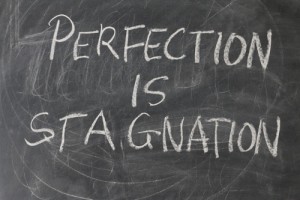Perfectionism Kills
- At August 11, 2017
- By rbadmin
- In Uncategorized
 0
0
Surely, at some point in your career, you’ve at least heard of that dreaded Human Resources interview question, “What’s your biggest weakness?” It’s a terrible question. It almost guarantees the interview subject will lie. And since anyone who asks it surely must know that, it diminishes people on both sides of the desk. Most of us think we know the “right” answer instinctively. “I’m a perfectionist.” It’s a weakness that comes across as a strength.
Professional psychologists know better. “Psychologists see perfectionism almost always as a handicap,” writes Adrian Furnham at Psychology Today. “They see perfectionists as vulnerable to distress, often haunted by a chronic sense of failure; indecisiveness and its close companion procrastination; and shame.”
Perfection is phantasmagorical. William Shakespeare still has his critics. So do Frank Lloyd Wright, Stanley Kubrick, J.K. Rowling and every other world famous master of his or her craft that you can think of. You won’t escape it either. Sorry.
But your productivity can crash along with your emotional state if you don’t get a grip on it. You’ll run into diminishing returns in the early stages of polishing your work to “perfection,” and you’ll eventually run into negative returns and end up hurting yourself.
Here’s an extreme real-world example:
A client of mine hired me to edit and independently publish a non-fiction book on Amazon.com. It took me a week or so to edit his book. It should have taken me another week or so at the most to turn his manuscript into an e-book and to design the trade paperback edition. He was so obsessed with the layout, though—with the font sizes, spacing before and after sub-headings, the position of his text boxes, the look of his chapter title pages, etc., that he had me fiddle with it on and off for more than six months. The final version was no better or worse than the first—it was just different. And he still wasn’t happy. He finally relented and sent me an email, saying he realized it was better to publish an imperfect book that to publish no book at all.
If only he’d figured that out six months earlier. He blew his own artificially imposed deadline and told me he lost thousands of potential sales at a conference he attended because his book wasn’t available yet. His bill was also sky-high when I finally invoiced him.
Most perfectionists don’t hurt themselves as badly as he did. Most perfectionists have employers who won’t let them delay their deliverables for the better part of a year. They still waste plenty of time, though, and their final work products aren’t much better—if they’re even better at all—after burning up so much angst.
This isn’t an argument for producing sloppy work. No one should ever produce sloppy work. Just don’t make the perfect (which doesn’t exist) the enemy of the good. Because if you do, your productivity is certain to crater and you’ll drive yourself crazy. Perfectionism isn’t a strength disguised as a weakness. It’s a genuine weakness that, in its extreme form, can be debilitating.

